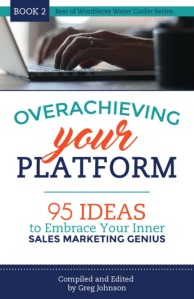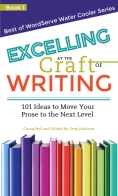Wow, what a year it has been! Not just personally, but also in the book industry. We’ve been very fortunate in the WordServe family that no employee or client has personally been taken out by the pandemic. Not all of our extended family members were as fortunate, of course. And we continue to pray for those left behind.
And now . . . it’s Christmas season. And while few will have a “normal” Christmas, we know that God’s character, His plan and His love is unchangeable. There is peace in knowing that, even amidst the chaos of living through a pandemic.
We get asked all of the time how we’re doing during these dark days in our history. Surprisingly, we’ve had our best year ever—by far. I can’t explain it except that publishers still have to publish 12 to 18 months from now, so they were open for business. And they were selling books! Many publishers are posting their own record profits.
Every year we like to look back on what the four agents here at WordServe were able to accomplish for our clients. Here’s a good sampling:
2020 Book releases:
Christian nonfiction projects: 25
Christian fiction: 7
General Market: 16
Foreign books: 3
2020 Books/projects signed:
First-time authors: 26 (a record by far)
Christian nonfiction: 54
Christian fiction: 7
General Market: 16
Collaborator projects: 6
Film options: 3
Specialty Bible: 1
That’s 87 books/projects signed in 2020. Another record.
So we’re very grateful that even amidst world chaos, we’ve been able to keep the ball moving down the field for our agency clients.
On behalf of our other three agents, Keely, Nick, and Sarah, and Ruthanne our faithful office manager/assistant, we send a heartfelt Have as Wonderful of a Christmas as you possibly can!
With warm Christmas wishes,
Greg Johnson, and the WordServe team
December News
New Releases
 Guideposts has released the 2021 devotional, All God’s Creatures: Daily Devotions for Animal Lovers.
Guideposts has released the 2021 devotional, All God’s Creatures: Daily Devotions for Animal Lovers.
Animals are God’s gift to humans. They are instruments of His Grace blessed with a special gift for comforting us when we are down, filling us with joy at just the right moment, and encouraging us on our walk of faith.
Read submissions from WordServe authors, Linda Clare and Kathy Carlton Willis, and be encouraged.
 Congratulations to Jennifer Love, MD and Kjell Tore Hovik, PsyD, PhD and Citadel Press for the release of When Crisis Strikes: 5 Steps to Heal Your Brain, Body, and Life from Chronic Stress.
Congratulations to Jennifer Love, MD and Kjell Tore Hovik, PsyD, PhD and Citadel Press for the release of When Crisis Strikes: 5 Steps to Heal Your Brain, Body, and Life from Chronic Stress.
YOUR BRAIN’S GREATEST ENEMY? CHRONIC STRESS. LEARN HOW TO REGAIN CONTROL, LIFE BALANCE, AND WELL-BEING.
The second in a line of health care books published in partnership with Dr. Daniel Amen and the Amen Clinics, When Crisis Strikes offers a proprietary 5-step program for tackling life crises and coping with chronic stress.
Stress is an unfortunate fact of modern life, and when those stressors are catastrophic–divorce, illness, caregiving, loss–a brain under stress becomes a brain in crisis. In this invaluable guide, award-winning psychiatrist Dr. Jennifer Love and neuropsychologist Dr. Kjell Hovik explore how to heal the damage that prolonged stress can do to your brain and your health. In When Crisis Strikes you’ll learn how to prevent these side effects from hijacking your daily life.
• Discover how your brain works with your body’s natural stress response system.
• Learn how mental and emotional cues cause physical reactions like muscle tension, pain, lowered sex drive, and more.
• Practice the five steps to relieve a stressor’s toll on your mind and your body.
• Utilize the tools to deal with any life crisis.
Including a foreword from renowned psychiatrist and brain health expert Dr. Daniel Amen, When Crisis Strikes provides hope and healing for everyone who has experienced the often-crushing weight of chronic stress.
 Congratulations to David Murrow and Salem Press for the release of Drowning in Screen Time: A Lifeline for Adults, Parents, Teachers, and Ministers Who Want to Reclaim their Real Lives.
Congratulations to David Murrow and Salem Press for the release of Drowning in Screen Time: A Lifeline for Adults, Parents, Teachers, and Ministers Who Want to Reclaim their Real Lives.
ARE YOU DROWNING IN SCREEN TIME?
Between Zoom meetings, online classes, social media, gaming, and binge-watching TV series, humans now spend most of their free time submerged in screen life—and that’s taking a toll on real life.
The good news: there is a way back. Bestselling author David Murrow’s new book is a rescue plan for parents, adults, teachers, and ministers who want to help others (or themselves) achieve screen-life/real-life balance.
Built around five simple parables, Drowning in Screen Time shows you:
• What screens are doing to your family and relationships
• Why screen content is so addictive
• How to find freedom and confidence in real life
Drowning in Screen Time is full of positive, practical ideas that can help you keep your digital head above water.
 Congratulations to Ron Hutchcraft and Harvest House for the January 5, 2021 release of Hope When Your Heart is Breaking.
Congratulations to Ron Hutchcraft and Harvest House for the January 5, 2021 release of Hope When Your Heart is Breaking.
Losing means grieving.
Grieving means choices.
Choices mean hurt or healing.
You’ve lost someone you love. Or you’re on the brink of losing your marriage. Your dreams. Your health. Or perhaps the trauma of your past pursues you into the present.
Your life’s going to change. Which way it goes won’t be decided by your loss, but by the choices you make.
At the crossroads of grief, one road will lead to hope and healing. The other, to more hurt.
Hope When Your Heart Is Breaking is an honest look at both roads, and how your greatest loss can lead to your greatest gain. Author Ron Hutchcraft writes from the deep well of his own devastating loss and grief, and points you to the practical steps that lead to peace and wholeness.
This book is a pathway to hope—a roadmap through the pain of grief and loss. Discover new strength through a new closeness to others and to God. And make the decisions that lead to comfort, growth, and life.
New Contracts
Ed Norwood signed with Freiling Publishers for Be A Giant Killer to be released December 2021.
Jennifer M. Rosner signed with InterVarsity Press for her book Recalling Jesus, to be published in 2022.
Linda MacKillop signed with Kregel Publishers for Try Again Farm to be released at the end of the year, 2021.
New Clients
Tammy Wilborn, Carissa Shillito, Catherine Ricketts joined WordServe this month. Welcome!

















